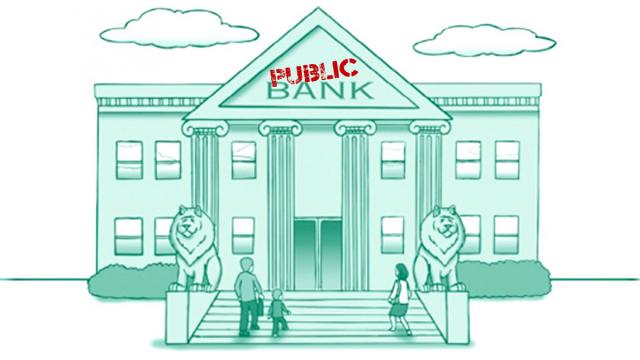
The campaign for public banking was launched more than six years ago by Ellen Brown, a lawyer, researcher and writer who was surveying the ruins of the U.S. economy – nearly every state and countless municipalities drowning in red ink – and observed that North Dakota was getting along swimmingly.
What Brown discovered was an engine of prosperity: the nation’s only public bank, the almost 100-year-old Bank of North Dakota.
The BND partners with the state’s community banks and local finance industry to distribute the affordable credit that was powering the North Dakota economy: budget surpluses, the lowest unemployment in the nation, the lowest rate of home foreclosures, no bank failures and affordable credit flowing into the state’s economy.
Economic Independence
Brown got to work, writing and speaking, and then formed the Public Banking Institute. Game on.
Brown was not alone in observing the role of the BND in that state’s remarkable prosperity. Legislators in about a dozen states soon introduced legislation to form or examine whether and how to form a public bank. Within two years that number had grown to 20.
In California, a capable team of public banking advocates got busy across the state, working on local government officers, legislative staffers, state office holders, and making news as they gathered the support of stakeholder groups.
It is axiomatic that lawmakers are not going to stick out their necks for an idea about which they know nothing, and for which they see no measurable constituent support. Not even in California. But Brown kept writing and speaking.
Later, a bill to create a commission to study the idea and make recommendations toward creating a publicly owned bank of California made it to the desk of Governor Jerry Brown, who promptly vetoed it.
Bills in other state legislatures fared even less well.
Public Banking Goes Local
Soon after the formation of the Public Banking Institute, the Pennsylvania Public Bank Project was launched. Its focus was on starting municipal public banks. The path is the same, but the lift is easier.
Rather than needing to gain the support of 200 legislators and overcome the institutional inertia enforced by Wall Street and many state treasurers – who are by no means anxious to share their control of state assets and the political power those assets confer – the decision makers number only a handful of city council members, mayors or county commissioners in any Pennsylvania city or large county. The math is the same in many states.
Public bank advocates in Pennsylvania started down that path, first identifying the best municipal opportunities. Philadelphia was of course the big prize, owing to its size in the American economy (the fifth largest market) and its storied role in American history.
But other opportunities emerged, like little Reading (pop. 85,000 and at the time the poorest city in the nation), Allentown, Pittsburgh and elsewhere.
Officeholder were familiarized with the idea while public bank advocates began reaching out to the stakeholders and constituent organizations to whom officeholders respond.
In union halls, board rooms, church halls, libraries, college and university campuses, at city council meetings, before professional societies and in the offices of elected officials, at forums and workshops, at breakfast, lunch and dinner, the work went on.
Similar efforts were launched in other American cities. A few months ago, Santa Fe, N.M., became the first city to move formally to examine how best to establish a public bank.
The next city to move may be Seattle, or Brunswick, Ga., or San Francisco, or Denver. In Pennsylvania, it could be Allentown or Philadelphia.
Timing is Everything
Every successful American politician operates with an eye always on the election calendar. Municipal public bank efforts in Pennsylvania and elsewhere are being brought forward this year because many mayors, city council members and county commissioner are on the ballot.
These efforts in turn bear on the actions of state lawmakers who are on the ballot next year. In almost every municipality or state, the most important stakeholder group are the community bankers. Their support for public banking could be decisive. Their opposition would be fatal.
Now, local public bank organizations from New York, New Jersey and Pennsylvania to New Mexico, Arizona and California are making the case and winning support of community bankers – many of whom previously knew as little about public banks as did key elected officials – in the fight to wrest control of American banking from Wall Street and return it to Main Street.
Meet my New Friend
It is said that politics makes strange bedfellows. It might be more accurate to say politics makes necessary bedfellows. This is being proved in municipal and state public bank efforts across the nation, where red as red Tea Party Republicans and true blue Democratic and Progressive Occupiers are joining a shared cause.
Occupiers want out from under Wall Street. The Tea Party wants out from under Washington. As Wall Street and Washington have been equated largely the same, the match was inevitable.
The dynamic in Pennsylvania is especially interesting. There, a newly elected Democratic governor and a solid and mostly conservative Republican majority in the legislature are miles apart on most of the issues that voters want dealt with. Public banking may be one of the few areas in which cooperation is possible.
While it's a sure thing that nothing will come out of Washington which Wall Street does not approve, that's not the case in American cities where mayors and council members are close, sometimes uncomfortably close, to the voters’ wrath.
New bedfellows are writing what may be the next chapter in the story of American democracy: a network of public banks to facilitate a lateral and collaborative distribution of affordable credit, enabling the diversity of American enterprise and initiative to challenge Wall Street and the Federal Reserve's control of banking and finance.
Public banks represent a paradigm shift away from the grotesque concentration of wealth toward a democratic control of our money and credit, which in turn breaks the concentration of political power that has subverted the American democracy.
And in that sense, American history is literally in the making.
Mike Krauss is a founder of the Public Banking Institute and chair of the Pennsylvania Project. He is a 30-year veteran of the international logistics and distribution industry, a former officer of Pennsylvania county and state government, and ED of the PA Republican State Committee.
3 WAYS TO SHOW YOUR SUPPORT
- Log in to post comments














